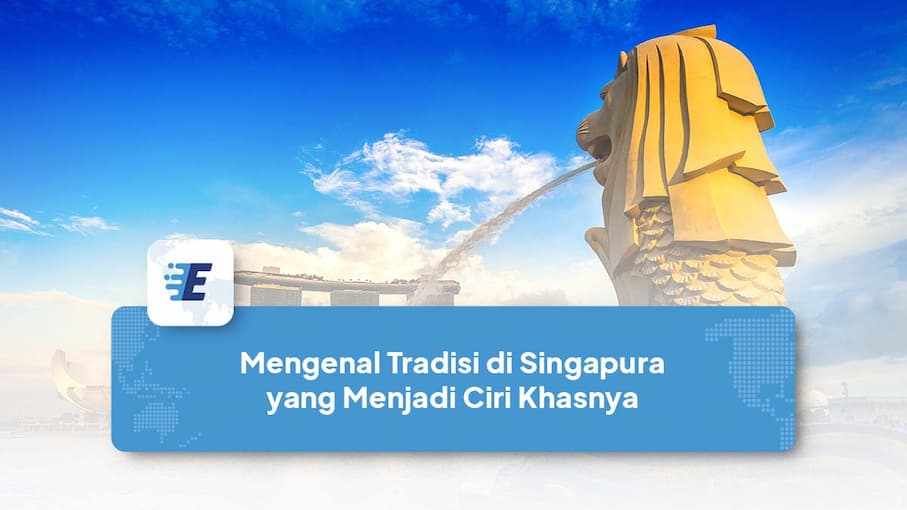Last updated on June 7th, 2024 at 11:13 am
Singapore is a country located at the southern tip of the Malay Peninsula that has carved its history as one of the world's leading economic and financial centers. Besides its rapid economic development, Singapore is also known for its rich cultural diversity. Let's delve deeper into the history, ethnicity, and traditions that make Singapore so unique.
History of Singapore
List of contents
Singapore is one of the countries that has now become one of the world's leading financial and technology centers, with a long history that includes various significant periods.
The pre-colonial period saw Singapore as a Malay settlement in the 14th century, with the establishment of the Sultanate of Singapore in the 15th century becoming an important trading hub. The British then took over Singapore in the 19th century, bringing economic growth through trade and port development.
World War II brought Japanese occupation and suffering to the people before Singapore returned to British rule. In 1963, Singapore joined Malaysia before finally gaining independence in 1965.
Under the leadership of Prime Minister Lee Kuan Yew, Singapore experienced extraordinary economic and social transformation, becoming a successful and advanced country.
To this day, Singapore continues to be an inspiration to many countries through its success in creating a harmonious multi-ethnic society and efficiently managing resources. The history of Singapore reflects the resilience and perseverance that form a strong foundation for current success.
Ethnic Groups of Singapore
Singapore has the sixth highest foreign population in the world, with around 42% of the total population. These foreigners contribute about 50% to the country's service sector, coming from various countries such as China, Malaysia, the Philippines, North America, the Middle East, Europe, Australia, Bangladesh, and India.
Singapore ranks second as the most densely populated country in the world after Monaco. In 2009, Singapore's population reached 4.99 million, with 3.73 million being citizens and permanent residents (“Singapore Residents”)
The number of citizens that year reached 3.2 million. The ethnic composition or ethnic groups of Singapore's population includes 74.2% Chinese-speaking groups, 13.4% Malays, and 9.2% Indians, while Eurasians, Arabs, and other groups form 3.2% of the total population.
What Traditions Exist in Singapore?
Singapore is a multicultural country, with the majority of its population being Muslim, Buddhist, Hindu, and Christian. Therefore, various religious celebrations are celebrated with great enthusiasm in Singapore. Here are some of the most popular religious celebrations in Singapore:
农历新年(春节)
Chinese New Year (Lunar New Year) is the most important celebration for the Chinese people in Singapore. This festival is celebrated for 15 days, starting with the Lunar New Year and ending with Cap Go Meh. During the Lunar New Year celebrations, the Chinese usually clean their houses, wear new clothes, and visit temples to pray. They also celebrate with family dinners, giving red envelopes (angpao), and lighting fireworks.
Hari Raya Idul Fitri
Hari Raya Idul Fitri is the most important celebration for Muslims in Singapore. This celebration marks the end of Ramadan, the holy month of Islam. During Idul Fitri celebrations, Muslims usually wear new clothes, go to the mosque for Idul Fitri prayers, and visit family and friends. They also celebrate with family dinners and sharing food.
Deepavali
Deepavali is the most important celebration for Hindus in Singapore. This festival marks the victory of good over evil. During the Deepavali celebrations, Hindus usually clean their houses, wear new clothes, and visit temples to pray. They also celebrate by lighting oil lamps, setting off fireworks, and having family dinners.
Christmas
Christmas is the most important celebration for Christians in Singapore. This celebration marks the birth of Jesus Christ. During Christmas, Christians usually attend mass, decorate Christmas trees, and give gifts. They also celebrate with family dinners and exchanging Christmas cards.
Hungry Ghost Festival
The Hungry Ghost Festival is a traditional Chinese festival celebrated for 15 days, starting on the 15th of July. This festival aims to honor the spirits of the deceased. During this festival, the Chinese usually visit graves to clean and pray for the dead. They also provide food and drinks for the spirits of the deceased.
Vesak Day Ritual
The Vesak Day Ritual is a Buddhist religious ritual celebrated to commemorate the birth, enlightenment, and death of Gautama Buddha. This ritual is celebrated by releasing pigeons, lighting candles, and praying.
Thaipusam Festival
The Thaipusam Festival is a Hindu religious festival celebrated to honor Lord Murugan. This festival is marked by a procession involving Hindus carrying kavadis, which are decorated with spikes and sharp objects.
Chingay Parade
The Chingay Parade is an annual cultural parade held in Singapore. This parade features various artistic and cultural performances from different ethnic groups in Singapore, including float parades, artistic performances, and colorful costumes.
Conclusion
With its rich history and ethnic diversity, Singapore offers an amazing view of how a country can combine ancient heritage with modern trends. With vibrant cultural celebrations, Singapore is a place where intercultural harmony and progress meet, creating something fascinating for its residents and visitors.
For those of you who need to send money to Singapore, just use Easylink! Easylink is the best solution for international money transfer services, besides sending money to Singapore Easylink can also send money to over 170 countries with either local currency or USD Global.
So, what are you waiting for? Use Easylink now for safer, easier, and faster international money transfers!

